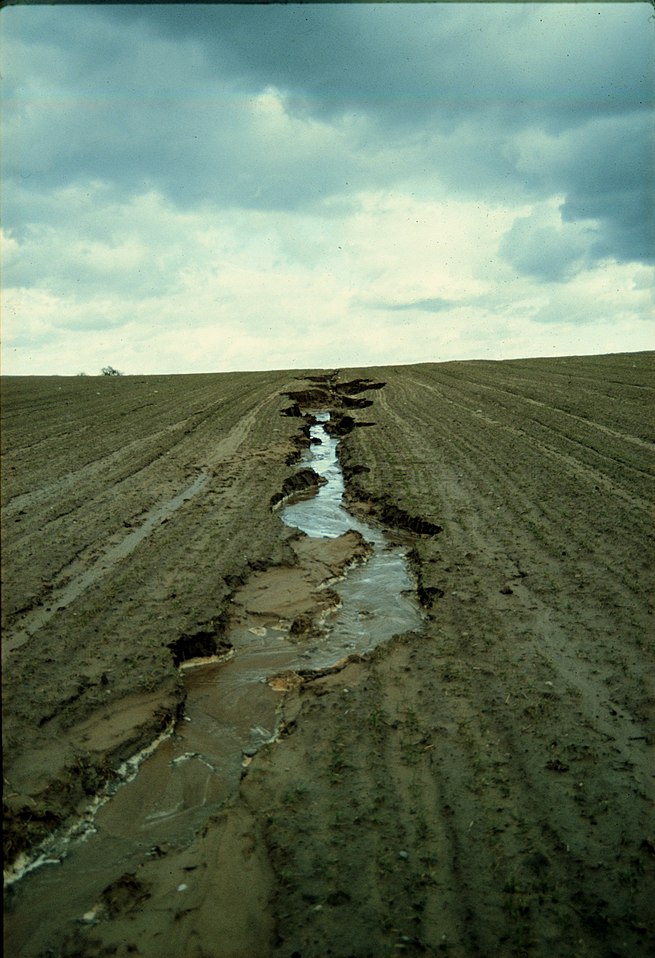
Main Difference
The main difference between Erosion and Corrosion is that the Erosion is a action of exogenic processes which remove soil and rock from one location on the Earth’s crust, then transport it to another location where it is deposited and Corrosion is a gradual destruction of materials by chemical reaction with its environment
-
Erosion
In earth science, erosion is the action of surface processes (such as water flow or wind) that removes soil, rock, or dissolved material from one location on the Earth’s crust, and then transports it to another location. Erosion is distinct from weathering which involves no movement. Removal of rock or soil as clastic sediment is referred to as physical or mechanical erosion; this contrasts with chemical erosion, where soil or rock material is removed from an area by dissolution. Eroded sediment or solutes may be transported just a few millimetres, or for thousands of kilometres.
Agents of erosion include rainfall; bedrock wear in rivers; coastal erosion by the sea and waves; glacial plucking, abrasion, and scour; areal flooding; wind abrasion; groundwater processes; and mass movement processes in steep landscapes like landslides and debris flows. The rates at which such processes act control how fast a surface is eroded. Typically, physical erosion proceeds fastest on steeply sloping surfaces, and rates may also be sensitive to some climatically-controlled properties including amounts of water supplied (e.g., by rain), storminess, wind speed, wave fetch, or atmospheric temperature (especially for some ice-related processes). Feedbacks are also possible between rates of erosion and the amount of eroded material that is already carried by, for example, a river or glacier. The transport of eroded materials from their original location is followed by deposition, which is arrival and emplacement of material at a new location.While erosion is a natural process, human activities have increased by 10-40 times the rate at which erosion is occurring globally. At agriculture sites in the Appalachian Mountains, intensive farming practices have caused erosion at up to 100x the natural rate of erosion in the region. Excessive (or accelerated) erosion causes both “on-site” and “off-site” problems. On-site impacts include decreases in agricultural productivity and (on natural landscapes) ecological collapse, both because of loss of the nutrient-rich upper soil layers. In some cases, this leads to desertification. Off-site effects include sedimentation of waterways and eutrophication of water bodies, as well as sediment-related damage to roads and houses. Water and wind erosion are the two primary causes of land degradation; combined, they are responsible for about 84% of the global extent of degraded land, making excessive erosion one of the most significant environmental problems worldwide.Intensive agriculture, deforestation, roads, anthropogenic climate change and urban sprawl are amongst the most significant human activities in regard to their effect on stimulating erosion. However, there are many prevention and remediation practices that can curtail or limit erosion of vulnerable soils.
-
Corrosion
Corrosion is a natural process that converts a refined metal into a more chemically-stable form such as oxide, hydroxide, or sulfide. It is the gradual destruction of materials (usually metals) by chemical and/or electrochemical reaction with their environment. Corrosion engineering is the field dedicated to controlling and stopping corrosion.
In the most common use of the word, this means electrochemical oxidation of metal in reaction with an oxidant such as oxygen or sulfates. Rusting, the formation of iron oxides, is a well-known example of electrochemical corrosion. This type of damage typically produces oxide(s) or salt(s) of the original metal and results in a distinctive orange colouration. Corrosion can also occur in materials other than metals, such as ceramics or polymers, although in this context, the term “degradation” is more common. Corrosion degrades the useful properties of materials and structures including strength, appearance and permeability to liquids and gases.
Many structural alloys corrode merely from exposure to moisture in air, but the process can be strongly affected by exposure to certain substances. Corrosion can be concentrated locally to form a pit or crack, or it can extend across a wide area more or less uniformly corroding the surface. Because corrosion is a diffusion-controlled process, it occurs on exposed surfaces. As a result, methods to reduce the activity of the exposed surface, such as passivation and chromate conversion, can increase a material’s corrosion resistance. However, some corrosion mechanisms are less visible and less predictable.
-
Erosion (noun)
The result of having been worn away or eroded, as by a glacier on rock or the sea on a cliff face.
-
Erosion (noun)
The changing of a surface by mechanical action, friction, thermal expansion contraction, or impact.
-
Erosion (noun)
The gradual loss of something as a result of an ongoing process.
“the erosion of a person’s trust”
“trademark erosion, caused by everyday use of the trademarked term”
-
Erosion (noun)
Destruction by abrasive action of fluids.
-
Erosion (noun)
One of two fundamental operations in morphological image processing from which all other morphological operations are derived.
-
Erosion (noun)
Loss of tooth enamel due to non-bacteriogenic chemical processes.
-
Erosion (noun)
A shallow ulceration or lesion, usually involving skin or epithelial tissue.
-
Erosion (noun)
In morphology, a basic operation (denoted ⊖); see Erosion (morphology).
-
Corrosion (noun)
The act of corroding or the condition so produced.
-
Corrosion (noun)
A substance (such as rust) so formed.
-
Corrosion (noun)
Erosion by chemical action, especially oxidation.
-
Corrosion (noun)
The gradual destruction or undermining of something.
